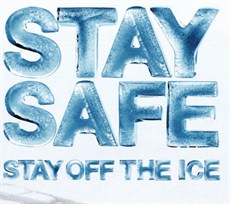
Venturing onto frozen ponds, reservoirs, lakes and canals is extremely dangerous and can easily have fatal results.
It might be tempting to walk or play on the frozen water but the ice can easily break.
The temperature of the water is cold enough to take your breath away, which can easily lead to panic and drowning.
The coldness can make your arms and legs numb which means you can't control them and can't swim.
It can lead to hypothermia - serious reduction in your body temperature - which can cause heart failure.
This happens to even the strongest swimmers!
Follow these simple steps to stay safe
- Never venture onto frozen water. Even if it appears thick from the bank, it becomes thinner very quickly.
- Adults – set a good example to children by staying off the ice yourselves.
- If a dog or other animal ventures onto the ice, or falls through it, do not go onto the ice to rescue it – you are likely to end up in the freezing water and unable to help the animal.
- Never throw sticks or balls onto the ice for your dog – keep them on a lead near frozen water. Over 50% of ice related drownings involve the attempted rescue of a dog!
- Alcohol and open water can be a lethal combination – keep well away from the edge of open water if you have been drinking alcohol.
- If you do see a person or animal in trouble in icy water, stay on the bank and phone 999. If you can reach the person with a branch, clothing tied together or other items then you could try to do so but stay firmly on the bank.
- Do not become a victim – phone 999!
Winter Water Safety | Royal Life Saving Society UK ( RLSS UK )
